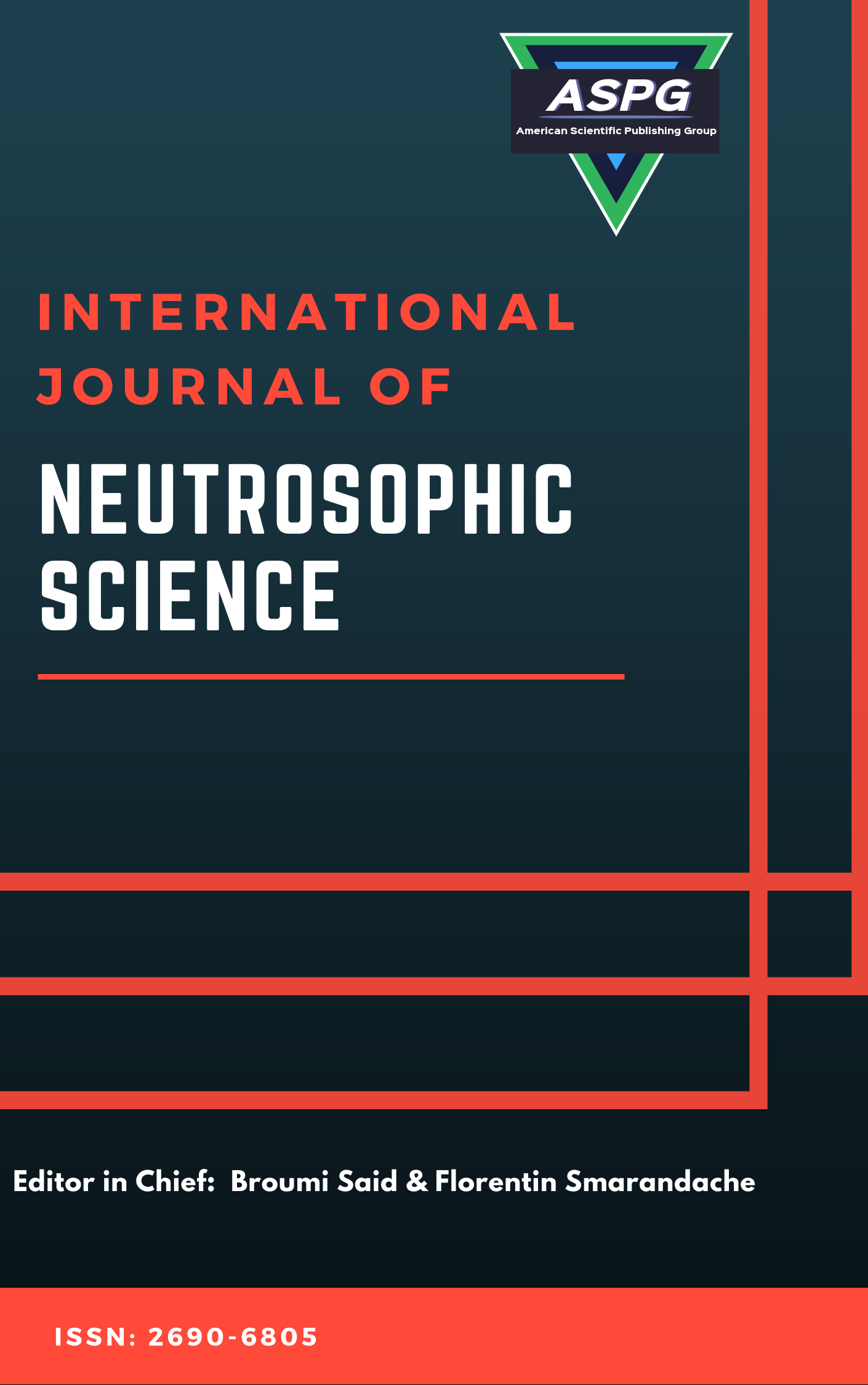

Volume 18 , Issue 4 , PP: 313-322, 2022 | Cite this article as | XML | Html | PDF | Full Length Article
R. Martínez Martínez 1 * , P. E. Acurio Padilla 2 , J. E. Jami Carrera 3
Doi: https://doi.org/10.54216/IJNS.180426
The globe has been coping with the COVID-19 epidemic, eagerly awaiting the completion of the vaccine process. Despite the Internet of Things (IoT) and its effect on supply networks, the recent epidemic has brought unprecedented supply chain disruptions. To assess the relevance of these issues, we speak with leading specialists. A novel distance-based similarity metric based on neutrosophic set theory is being used in this research to examine IoT challenges in the supply chain. The proofs for each of the properties are provided straightforwardly.
Neutrosophic Sets , Similarity Distance , COVID-19 , Supply Chain.
[1] D. Kiel, C. Arnold, and K.-I. Voigt, “The influence of the Industrial Internet of Things on business
models of established manufacturing companies–A business level perspective,” Technovation, vol. 68,
pp. 4–19, 2017.
[2] M. Ben-Daya, E. Hassini, and Z. Bahroun, “Internet of things and supply chain management: a literature
review,” International Journal of Production Research, vol. 57, no. 15–16, pp. 4719–4742, 2019.
[3] W. Bauer, M. Hämmerle, S. Schlund, and C. Vocke, “Transforming to a hyper-connected society and
economy–towards an „Industry 4.0,‟” Procedia Manufacturing, vol. 3, pp. 417–424, 2015.
[4] E. Hofmann and M. Rüsch, “Industry 4.0 and the current status as well as future prospects on logistics,”
Computers in industry, vol. 89, pp. 23–34, 2017.
[5] B. Tjahjono, C. Esplugues, E. Ares, and G. Pelaez, “What does industry 4.0 mean to supply chain?,”
Procedia manufacturing, vol. 13, pp. 1175–1182, 2017.
[6] J. M. Müller, D. Kiel, and K.-I. Voigt, “What drives the implementation of Industry 4.0? The role of
opportunities and challenges in the context of sustainability,” Sustainability, vol. 10, no. 1, p. 247, 2018.
[7] H. S. Birkel and E. Hartmann, “Internet of Things–the future of managing supply chain risks,” Supply
Chain Management: An International Journal, vol. 25, no. 5, pp. 535–548, 2020.
[8] M. Tu, “An exploratory study of Internet of Things (IoT) adoption intention in logistics and supply chain
management: A mixed research approach,” The International Journal of Logistics Management, 2018.
[9] S. Shah, M. Bolton, and S. Menon, “A study of internet of things (IoT) and its impacts on global supply
chains,” in 2020 International Conference on Computation, Automation and Knowledge Management
(ICCAKM), 2020, pp. 245–250.
[10] H. S. Birkel and E. Hartmann, “Impact of IoT challenges and risks for SCM,” Supply Chain
Management: An International Journal, 2019.
[11] I. Heckmann, T. Comes, and S. Nickel, “A critical review on supply chain risk–Definition, measure and
modeling,” Omega, vol. 52, pp. 119–132, 2015.
[12] X. V. Wang and L. Wang, “A cloud-based production system for information and service integration: an
internet of things case study on waste electronics,” Enterprise Information Systems, vol. 11, no. 7, pp.
952–968, 2017.
[13] W. L. Griffin et al., “Zircon chemistry and magma mixing, SE China: in-situ analysis of Hf isotopes,
Tonglu and Pingtan igneous complexes,” Lithos, vol. 61, no. 3–4, pp. 237–269, 2002.
[14] N. C. Whittier, S. Williams, and T. C. Dewett, “Evaluating ethical decision‐making models: a review
and application,” Society and Business Review, 2006.
[15] V. Ulucay, A. Kılıç, M. Sahin, and H. Deniz, A new hybrid distance-based similarity measure for refined
neutrosophic sets and its application in medical diagnosis. Infinite Study, 2019.
[16] D. Liu, G. Liu, and Z. Liu, “Some similarity measures of neutrosophic sets based on the Euclidean
distance and their application in medical diagnosis,” Computational and mathematical methods in
medicine, vol. 2018, 2018.
[17] M. Poonia and R. K. Bajaj, “On Measures of Similarity for Neutrosophic Sets with Applications in
Classification and Evaluation Processes,” Neutrosophic Sets and Systems, vol. 93, pp. 86–100, 2021.
[18] P. Majumdar and S. K. Samanta, “On similarity and entropy of neutrosophic sets,” Journal of Intelligent
& Fuzzy Systems, vol. 26, no. 3, pp. 1245–1252, 2014.
[19] M. Velasquez and P. T. Hester, “An analysis of multi-criteria decision making methods,” International
journal of operations research, vol. 10, no. 2, pp. 56–66, 2013.
[20] S. Pramanik, S. Dalapati, S. Alam, F. Smarandache, and T. K. Roy, “NS-cross entropy-based MAGDM
under single-valued neutrosophic set environment,” Information, vol. 9, no. 2, p. 37, 2018.